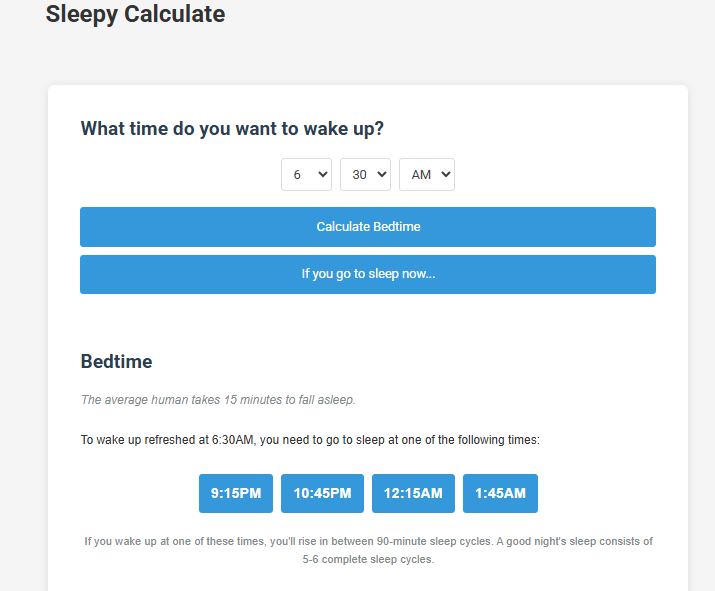
Sleep is not just rest – it is the foundation of a healthy and productive life. In our fast-paced world, many of us underestimate the importance of sleep timing. We focus on how many hours we should sleep, but very few consider when we should actually go to bed. That timing makes all the difference between waking up fresh or dragging yourself out of bed with grogginess.
If you’ve ever wondered, “What is the best time to sleep so I can wake up refreshed?” – the answer lies in understanding your body’s natural rhythms and cycles. Thankfully, modern tools like the Sleepy Calculator make this super easy.
👉 Click here to use the Sleepy Calculator and discover your ideal sleep time
Why Sleep Timing Matters More Than You Think
Our bodies are governed by something known as the circadian rhythm – an internal biological clock that regulates when we feel awake and when we feel sleepy. This rhythm is influenced by light, hormones, and daily habits. When you sleep at the “wrong” time, you’re essentially fighting against your natural biology.
The result?
-
Difficulty waking up in the morning
-
Morning grogginess, also known as “sleep inertia”
-
Decreased focus during the day
-
Higher stress levels
-
Increased risk of health issues in the long run
On the other hand, sleeping in harmony with your circadian rhythm helps your body restore energy, repair cells, and regulate hormones. That’s why it’s not just how long you sleep but when you sleep that makes all the difference.
Sleep Cycles: The Secret to Waking Up Refreshed
Here’s a fascinating fact: Sleep doesn’t occur in one long, continuous block. Instead, it happens in repeating sleep cycles, each lasting around 90 minutes.
Each cycle has different stages:
-
Light Sleep – where you’re drifting in and out
-
Deep Sleep – crucial for physical restoration
-
REM Sleep – where dreaming happens and memory gets consolidated
The key to waking up refreshed is not just completing enough hours of sleep, but also waking up at the end of a sleep cycle, rather than in the middle of one. That’s why sometimes you can sleep for 8 hours and still feel tired, while after 6 hours you might feel surprisingly fresh – it all depends on where in the cycle you wake up.
How the Sleepy Calculator Helps
This is where the Sleepy Calculator comes in. Instead of doing complex math in your head, this simple tool calculates your optimal bedtime based on the time you need to wake up.
For example:
-
If you need to wake up at 7:00 AM, the calculator will suggest multiple bedtimes such as 10:00 PM, 11:30 PM, or 1:00 AM. Each option is designed so that you wake up at the end of a 90-minute cycle, feeling alert rather than groggy.
It works the other way too – if you know when you’re going to bed, it can tell you the best times to wake up.
👉 Try the Sleepy Calculator now and plan your perfect night’s sleep
Benefits of Using a Sleep Calculator
-
Easier Mornings – No more hitting snooze 5 times.
-
More Energy Throughout the Day – You’ll feel less sluggish and more motivated.
-
Improved Productivity – Mental clarity, sharper focus, and better decision-making.
-
Better Mood – Quality sleep lowers stress and boosts emotional balance.
-
Healthier Body – Proper sleep reduces the risk of obesity, heart problems, and weak immunity.
Best Bedtime for Different Lifestyles
While the calculator gives you precise times, here are some general tips based on lifestyle:
-
Students & Young Adults – Try sleeping by 11:00 PM to align with natural melatonin release. Late-night cramming may help temporarily, but it disrupts cycles in the long run.
-
Working Professionals – Aiming for 10:30 PM–11:00 PM ensures you complete enough cycles before an early morning.
-
Parents – Flexibility is key, but try to match your sleep with your children’s sleep cycles to avoid fatigue.
-
Night Shift Workers – Use blackout curtains and stick to a consistent routine. The Sleepy Calculator can still help optimize your rest times.
How to Improve Sleep Quality (Beyond Just Timing)
Even with the best calculator, poor sleep habits can sabotage your rest. Combine the right timing with these lifestyle tips:
-
Limit Screen Time – Blue light from phones and laptops delays melatonin production.
-
Create a Wind-Down Routine – Reading, stretching, or meditation signals your body it’s time to rest.
-
Keep Your Bedroom Cool and Dark – An environment of around 18–20°C is ideal.
-
Avoid Caffeine Late in the Day – Coffee, tea, and energy drinks can interfere with sleep cycles.
-
Stay Consistent – Sleeping and waking at the same times every day keeps your body clock steady.
Frequently Asked Questions
Q: Is 6 hours of sleep enough?
A: For some, yes, if it’s aligned with complete cycles. But most adults function best with 7–9 hours.
Q: What if I can’t sleep at the “right” time?
A: Try to at least wake up at the end of a sleep cycle. The calculator helps here.
Q: Does it matter if I sleep late as long as I get enough hours?
A: Late-night sleep can disrupt circadian rhythms, affecting hormones and overall health. Ideally, aim to sleep before midnight.
Final Thoughts
The best time to sleep isn’t a one-size-fits-all answer. It depends on when you need to wake up and how your body’s natural cycles work. The good news is that you don’t need to guess or calculate manually anymore – the Sleepy Calculator makes it effortless.
By syncing your sleep with natural cycles, you can wake up refreshed, boost productivity, improve mood, and take a huge step toward a healthier lifestyle.
👉 Use the Sleepy Calculator now and find your perfect bedtime
